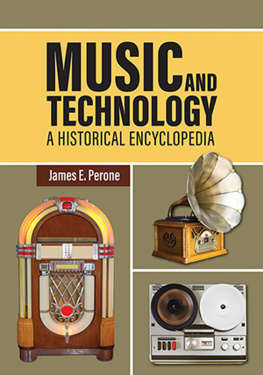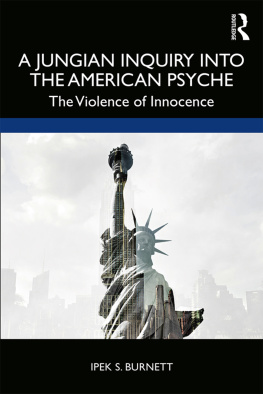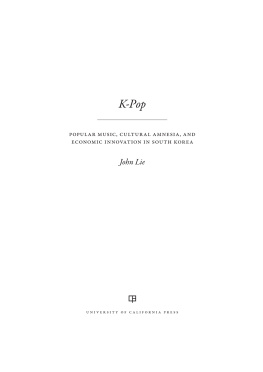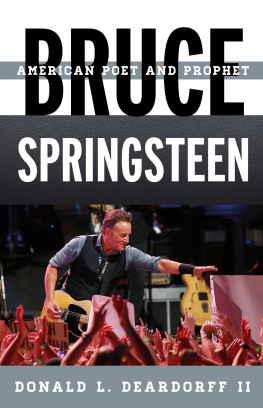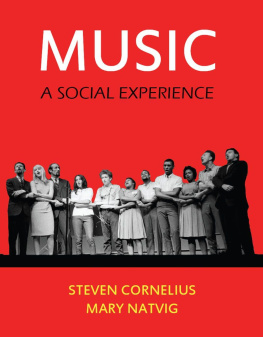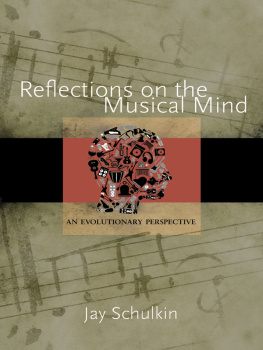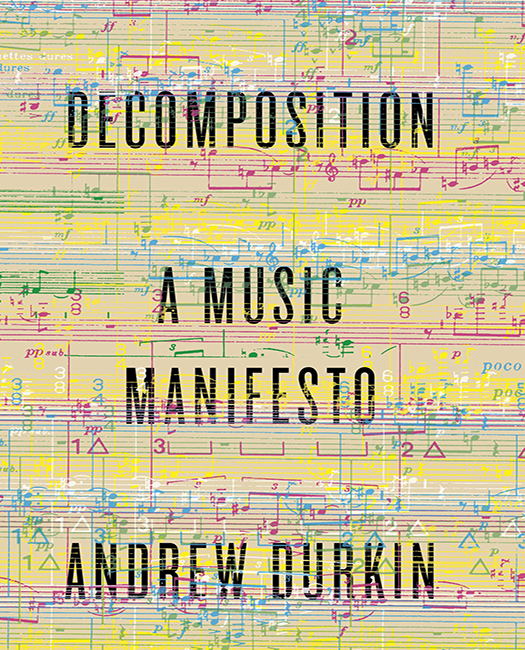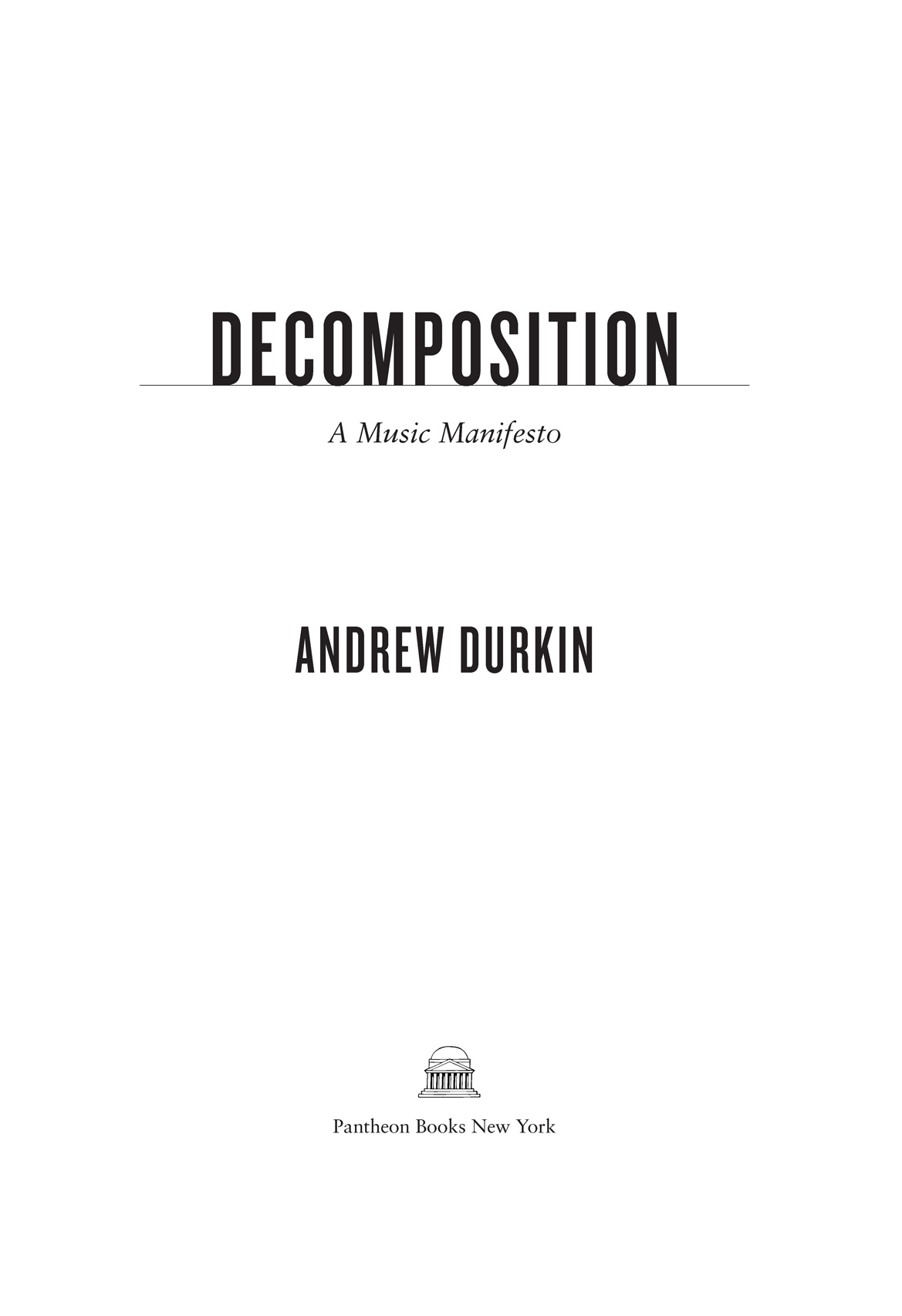Copyright 2014 by Andrew Durkin
All rights reserved. Published in the United States by Pantheon Books, a division of Random House LLC, New York, and in Canada by Random House of Canada Limited, Toronto, Penguin Random House companies.
Pantheon Books and colophon are registered trademarks of Random House LLC.
Grateful acknowledgment is made to the following for permission to reprint previously published material: Alfred Music: Excerpt from So You Want To Be a Rock n Roll Star, words and music by Roger McGuinn and Chris Hillman, copyright 1966, copyright renewed, by Reservoir Media Management, Inc. and Sixteen Stars Music. All rights for Reservoir Media Music (ASCAP) administered by Reservoir Media Management, Inc. Reservoir Media Music (ASCAP) administered by Alfred Music. All rights reserved. Reprinted by permission of Alfred Music. Hal Leonard Corporation: Excerpt from The Entertainer, words and music by Billy Joel, copyright 1974, copyright renewed, by Joelsongs. All rights administered by Almo Music Corp. All rights reserved. Reprinted by permission of Hal Leonard Corporation.
Getty Images: Photo of Saxophone and Big Jay McNeely and Crowds and Audience by Bob Willoughby/Redferns, United States, circa 1951. Reprinted by permission of Getty Images. akg-images Ltd: Ludwig van Beethoven and intimates, listening to him playing, painting by Albert Graefle, image AKGORD5193. Reprinted by permission of akg-images.
Library of Congress Cataloging-in-Publication Data
Durkin, Andrew.
Decomposition: a music manifesto / Andrew Durkin.
pages cm
Includes bibliographical references and index.
ISBN 978-0-307-91175-9 (hardcover: alk. paper). ISBN 978-0-307-91176-6 (eBook).
1. MusicPhilosophy and aesthetics. 2. Music appreciationPsychological aspects. 3. Music appreciationSocial aspects. 4. Sound recordingsSocial aspects. 5. Music and technology. I. Title.
ML3800.D93 2014 781.1dc23 2014017686
www.pantheonbooks.com
Jacket design by Peter Mendelsund
First Edition
v3.1
For John Paul Ryan, who loved both art and ideas
CONTENTS
INTRODUCTION
There are so many approaches to listening to music, and music has been designed in so many ways to meet these approaches, that some ethnomusicologists have declared that there is no universal phenomenon of music.
Robert Jourdain
The eighteenth century musician was taught to see the whole of musical history as a hill rising gently and undulatingly out of darkness, with the music of his own time standing on the sunlit summit; the modern musician is encouraged to view it as a rather alarming slope, studded like Easter Island with titanic heads, far larger than life. And he may even have an uneasy suspicion that the slope is a downward one, and that the noisy and polemical modernists who lead the way are, like the maiden in one of Ernest Bramahs incomparable stories, uttering loud and continuous cries to conceal the direction of their flight.
Thurston Dart
The title of this book comes from the old joke about what Beethoven is doing these days. Its a cheap laugh, to be sure, but the punch line (decomposing!) is a nice metaphor for my purpose: to demythologize music without demeaning it. A composer myself, I contend that the exalted view of musical composition associated, in the Western tradition, with Beethoventhough it is by no means limited to himhas a way of interfering with the fullness of our musical life. By constraining musical understanding within the limits of traditional notions of authorship, and a blind faith in authenticity, that exalted view distracts us from the processes that produce musicnot the conscious creative processes of the individual composer (many composers are only too happy to talk about how they work) but the much less obvious contributions of a broad array of collaborative and mediating activity. We have become accustomed to focusing on the end result of musical production as if thats all there is to it. And when this distraction occurs, when the final stage of a creative arc is presented as the entire thing itself, something valuable in our experience of music is lost.
Perhaps that seems too dramatic a way of putting it. Perhaps our experience of music is doing just fine, thank you very much. And yet today even many emphatic fans articulate ennui and despair about the art form. The last few years have seen the emergence of a kind of death cult for music, greatly expanding on the infighting angst that has always marked particular genres in the modern era (as evidenced, for instance, by the jazz is dead meme). What we see now is something more thorough, a simultaneously economic, aesthetic, and philosophical cri de coeur, the impact of which is discernible, for instance, in the presumptuous eschatology of Frontlines episode The Way the Music Died (2004), Andrew Shapters documentary Before the Music Dies (2006), and Andrew Keens book The Cult of the Amateur (2007), which divided its discussion of music into two chapters, The Day the Music Died [side a] and The Day the Music Died [side b].
Keen claims that in the wake of postmodernity its quite conceivable that we will see the end of a cultural economyby which he means the end of a marketplace in which art is bought and sold. Others have suggested that the problem is more strictly aesthetic. For more than half a century weve seen incredible advances in sound technology but very little if any advance in the quality of music, composer Glenn Branca wrote in the New York Times in 2009, in an article whose titleThe End of Musicechoed Frontline, Shapter, and Keen (and like them seemed a brazen attempt to get a rise out of audiences). Many responded with variations of the same rebuttal: if you dont know any good modern music, youre not looking in the right place. Curmudgeons are eternal, wrote one commenter. This could have been written any time in the last 30 (100?) years.
But whether or not the curmudgeons are right, this is a time of great concern about the future of music, even for those of us who never stopped loving it. Working musicians worry publicly about how to adapt to the changed landscape of the twenty-first centurynotwithstanding the fact that many of them, like singer-songwriter Jonathan Coulton, or folk songstress Amber Rubarth, or geek rocker Adam Rabin, or guitarist and producer Chris Schlarb, or singer and improviser Fay Victor, or clarinetist and vocalist Beth Fleenor, or solo bassist and blogger Steve Lawson, have come up with creative new definitions of what it means to have a music career. Fans today enjoy greatly expanded access to a universe of musical offerings unthinkable even fifteen years agowhether or not they choose to partake of it legally or fairly. And the industrys institutions wobble topheavily between mandating an increasingly outdated conception of what a musical community should look like, on the one hand, and tapping into new dynamics for that community, on the other. All the while, there has been a great deal of anxiety about how we value musicbut also about what music means, what it is for, and even what it is.


